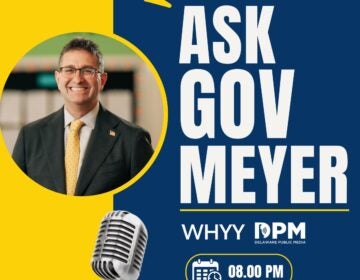Delaware special election candidates debate; highlight party differences

Special election candidates vying for an open State Senate seat in Delaware faced off in a debate Wednesday night, which at times became heated while on the topic of party differences.
WDEL Radio in Wilmington sponsored the debate. The format was set up so that all candidates would question each other on their respective positions.
Republicans and Democrats currently split control of the senate because former State Sen. Bethany Hall Long, D-Delaware, created a vacant seat when she became Lt. Governor. Three candidates now hope to gain control of the district that covers Middletown, parts of Newark and Glasgow.
If environmental attorney Stephanie Hansen is elected Feb. 25, Democrats will regain control. If realtor John Marino wins, republicans will have senate control for the first time in 44 years. While an unlikely win, libertarian party candidate Joe Lanzendorfer could be a tie-breaker in the Senate.
During the debate at Middletown High School in Middletown, the three candidates pointed to how they believe their wins would bring change to state politics.
Marino, who lost Senate and House elections in 2014 and 2010, said Democrats have had power in the Senate for too long, have worsened the state’s deficit, education system and economic development.
“If you vote for my opponent you will get more of the same power in the Senate, and the same power in the Joint Finance Committee, making the same decisions to where we are today,” he said.
Meanwhile, Hansen, who served as New Castle County President between 1997 and 2001, said republicans mimic national politics, supporting a partisan agenda, rather than doing what’s best for constituents. She said Republicans blocking Gov. John Carney’s pick for Secretary of the Department of Natural Resources and Environmental Control is a perfect example.
“The only way we’re going to be able to keep the federal republican agenda from settling in our living room is having our own fortification here at home,” Hansen said.
“It’s going to be gridlocked exactly as it is in Washington. Delaware doesn’t want anything to do with the party politics in Washington. We have been able to work across the aisle for a long time. It’s only now with this nationalism and empowerment in Washington that it’s actually coming back and settling here, that’s the problem.”
Lanzendorfer said a third party would force the two mainstream parties to work together.
“My presence in the senate would create the best of both worlds and better legislation for Delawareans,” he said.
National political topics came up more than once during the debate, including President Trump’s executive order banning entry of individuals from seven majority-Muslim countries for 90 days, refugees for 120 days and Syrian refugees indefinitely.
When asked where they stand on the issue and if they would fight the ban in court, Lanzendorfer and Hansen agreed the ban is against America’s constitutional rights, while Marino said the state must ensure tax payer resources “are first utilized for citizens of the state of Delaware.”
When candidates were asked where they stood on Roe v. Wade, Hansen and Lanzendorfer said they are pro-choice, while Marino said he was pro-life.
On the topic of capital punishment, all three candidates said they agree with Delaware’s Supreme Court ruling it unconstitutional.
The candidates also discussed the state’s budget, which legislators say is the most pressing issue facing Delaware today—as the new administration must find a way to alleviate a $350 million deficit.
Hansen said raising taxes is not the answer to the problem—that there should be a state assessment of government to address waste. She also said the State could benefit from the redevelopment of industrial properties, which is something she has been involved in for several years.
“The problem we have is the largest part of our revenue should come from personal income tax, which is directly tied to jobs,” Hansen said. “The emphasis here should be on strategic economic development—that is key to getting us out of the budget deficit we have.”
Marino said Delaware’s problem is spending, not revenue. He said there should be an analysis of spending, and cut funding to programs that aren’t successful.
“Our elected officials show a total lack of respect for tax payer money,” Marino said. “We need to tighten our belts and put metrics in place to analyze where money is being spent.”
Lanzendorfer said he agrees spending is an issue, and added that legalizing, regulating and taxing cannabis would solve much of the state’s budget challenges. There currently are movements in the General Assembly to vote on legalization legislation. Lanzendorfer added the money raised from legalization could also support an education voucher system that would allow parents more choice in schools.
On education, Marino said parents have “zero confidence” in the state’s education system, because the State has too many mandates on how teachers conduct their job.
Both Lanzendorfer and Hansen said there’s too much time spent on standardized tests, and are in favor of the so-called “opt-out”—but Marino called Hansen out on flip-flopping on the issue on her campaign site.
Hansen said the accusation is false, and that she had previously been neutral on the topic.
“For someone to sit up here and say you want to help the public school system who actively worked against the Appoquinimink referendum and proudly worked against it, I find that a bit hypocritical,” she said.
The candidates also discussed the opiate epidemic in Delaware, agreeing it should be treated as a mental health issue, not a criminal justice issue.
“The first thing we must do is recognize as a society that addiction is a disease, and we need to treat it as such, and not put someone in prison and set them up for failure,” Marino said.
Lanzendorfer said the state must address the prescription drug market, which leads many individuals to heroin, while Hansen said she commits to opening a full treatment mental health and substance abuse center in the district.
The candidates also expressed their opinions on environmental protections, such as the Coastal Zone Act, which environmentalists believe is necessary to protect the coast, while business advocates say it’s too restrictive.
“We need to protect our beaches, it is a huge source of revenue, it does a lot of good for our businesses,” Lanzendorfer said. “Delaware beaches are beautiful, it’s the best part of Delaware.”
Hansen calls the act one of Delaware’s “premier” environmental laws.
“It has preserved such beautiful coastlines,” she said. “What we weren’t anticipating back in the ‘70s when we put it in place was the environmental legacy left by industrial sites that won’t get cleaned up on their own.”
WHYY is your source for fact-based, in-depth journalism and information. As a nonprofit organization, we rely on financial support from readers like you. Please give today.





